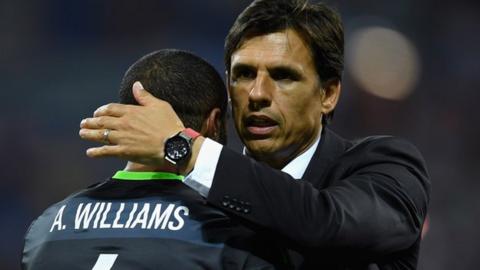Chris Coleman says the 2018 World Cup campaign will be his last as Wales manager.
Having led Wales to a historic semi-final at Euro 2016, Coleman's stock is at an all-time high.
The 46-year-old is contracted until the end of the next World Cup, with his team playing their first qualifier at home to Moldova on 5 September.
"I am sure this will be my last campaign whether we qualify or not," said Coleman.
"That will be six or seven years in the job, which is a long time. So I think this will be my last hit, at it so I will give it my best shot, but I would not consider going anywhere else. I want to see this through.
"There's success in this team, I think, because they're at a good age. But I'll certainly give everything I've got in this next campaign. I'll make sure they do."
Coleman has overseen a remarkable transformation in Wales' - and his own - fortunes since his appointment in January 2012.
- Wales' homecoming party
- Wales should stay at Cardiff City Stadium
- Joe Ledley misses homecoming party
Five months earlier, Wales had fallen to their lowest world ranking of 117th and, despite making the worst start of any Wales manager with four defeats from his first four games, Coleman is now guiding his country through its most successful era.
Euro 2016 was Wales' first appearance at a major tournament for 58 years, and their progress to the semi-finals saw them eclipse the previous best performance at a major tournament - reaching the last eight at the 1958 World Cup.
Coleman was rewarded for qualification with a new contract in May, which runs until after the 2018 tournament in Russia, and has no regrets about agreeing the deal before Wales' Euro 2016 success.
"If they [FAW] wanted to talk to me about another contract I would be cashing in a bit, wouldn't I? Same as if I jumped ship and went somewhere else because we had done well at a tournament.
"I would not feel right. I have signed a good contract and I am looking forward to the campaign."
'We will be a scalp'
Wales have been the underdogs for much of their history, though that could change following their achievements at Euro 2016.
Coleman's men have been handed a relatively kind qualifying draw for the 2018 World Cup, playing in the same group as Austria, Serbia, Republic of Ireland, Georgia and Moldova.
"The biggest challenge for us is that we will be a scalp now in this campaign because of what we've just done," said Coleman.
"Teams will play differently against us and rather than us being the underdogs, which we're very good at, we'll be expected to win.
"We've not been used to breaking teams down. We've been used to hitting teams on the counter-attack because they've attacked us because they expect to get something from us.
"We may have to look at how we approach it slightly differently in terms of what the opposition are going to do to us."
Making 'brave' changes
Coleman favoured a 5-3-2 formation at Euro 2016, having used the same system for most of the qualifying campaign.
The former Fulham manager has switched to a four-man defence in the past - a goalless draw in Belgium in 2014 among its most effective deployments - and he is considering further tactical alterations before the 2018 World Cup campaign.
"When you change formation with an international team, sometimes you're on thin ice, but you have to be brave and I will," Coleman added.
"I'd rather do that than not do anything. In my first campaign, for large parts of it I didn't do anything. I left it the same. I wouldn't make that same mistake again.
"You learn from that, you learn from failing and coming up short. I was trying to do everything that Speeds [the late Gary Speed, Coleman's predecessor] was doing because I was told it was working and don't change it.
"It didn't work for me - it blew up in my face. I'll never make that mistake again."




No comments:
Post a Comment